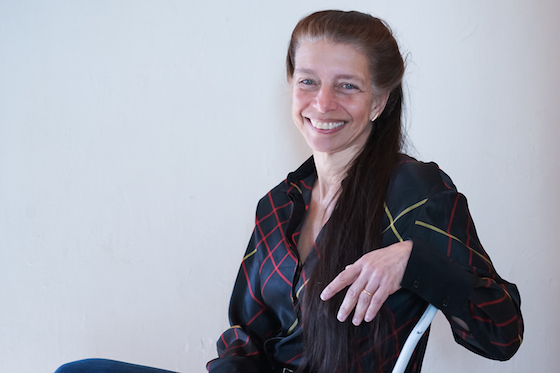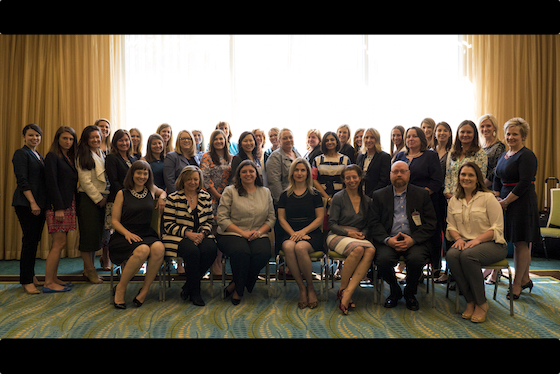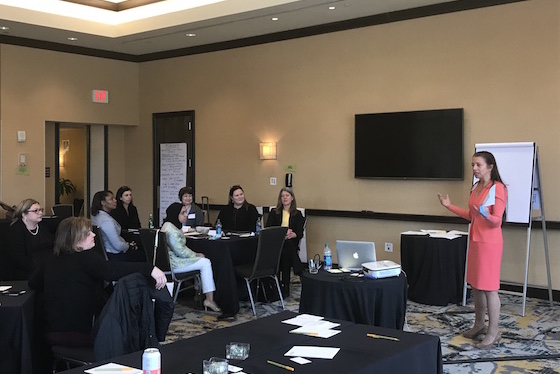These are the numbers: Women make up 30% of managers at the vice president and district director level within hotel companies. Higher up, they represent 20% to 28% of senior and executive vice president positions. Men are 10 times more likely to be promoted to principal, partner or president.
The statistics come from the Atlanta-based Castell Project, a nonprofit initiative created by founder and President Peggy Berg in 2017 to track and monitor the status of women within hospitality and, more important, create programming to bump those numbers up and hold companies accountable.

“The industry collectively tends to think the problem’s fixed and it’s not,” says Berg, a former consultant and Hilton and Choice franchisee. “There’s a comfortableness that comes from a lot of like people talking to each other and agreeing with each other, but it’s still not fixed.”
“This is the time we have the momentum, because of a tremendous talent pipeline, we have the momentum in the industry to move the numbers,” she says.
This type of bias isn’t limited to the hiring process; it also affects the voices the industry chooses to amplify. A February New York Times op-ed points out that women are consistently underrepresented in general news coverage by a ratio of 3 to 1; political science papers by women, for instance, are systematically cited less than those by men.
As Castell’s research shows, from 2016 through 2017, at the four big hotel investment conferences, women represented only 21% of attendees. An even more depressing number? Only
13% of panelists – those publically voicing their thoughts and opinions on the industry – were female.
“Eventually I taught him women could be in the partnership”
It was a bartending job while she was attending school at Michigan State University where Berg tapped into a love for the restaurant business, steering her to major in hotel and restaurant management. Her first job out of college was with the consulting firm now known as Pannell Kerr Forster.
Or, as she describes it: “140 white men and me.”
She said her male boss at that time was “of the opinion that women should never be voted into the partnership.” Despite that limitation, Berg said that boss actually ended up being a strong mentor for her.
“He taught me so much,” Berg says. “He taught me self-discipline, he taught me to be analytical, he taught me to bring out team members.
“And eventually I taught him that women could be in the partnership.”
Yes, that’s right: Berg became one of the firm’s first woman partners at the age of 32, after 10 years of climbing the corporate ladder.

“The rest of us are basically running along behind her,” says Karen Johnson, a Castell board member and longtime friend of Berg’s. “She’s on a mission and she’s not taking any prisoners.”
For Johnson, the key is getting higher-ups (more frequently male) to see the potential of their female workers.
“For most men, they’re looking out at their subordinates and their eyes catch on the person who looks like they did at that age,” continues Johnson, president of New York-based Pinnacle Asset Management. “Whether or not he is worthy of that mantel.”
“When I was elected to that partnership (at PKF), I thought the problem was fixed,” Berg says. “Like, obviously somebody had to be first but after that it would just solve itself and ultimately, it didn’t. And every year when I look around the industry, I’m reminded that it doesn’t solve itself.”
Berg eventually left PKF and founded her own consulting firm, the Highland Group (which she’s since sold), becoming a Comfort Inn and Hampton Inn franchisee along the way.
The year Berg formed Highland Group, she had her first baby.
“The year I had that baby, I produced more for the Highland Group than I had produced for PKF in the couple of years leading up to it,” she says. “And the reason I could produce more was because I worked smarter. So if you assume that in order to productive, a woman has to do exactly the same process that she did before she had a child, you’re setting her up for failure and you’re trapping the company inside of a box.”
“It’s a mission for her,” says Johnson, “and it’s ironic because if she’d had two daughters, you might ascribe the passion to her wanting to make things better for her daughters, but she’s got two sons. This is all to make sure that women coming up now don’t go through the same frustrations she did.”

Looking ahead to actionable steps
The Castell Project has multiple prongs: There’s the research (the nonprofit partners with Georgia State University), but then there’s also a year-long training program for women and female-identifying executives that teaches skills like aggressive negotiating and communication strategies. In addition, Berg has been compiling lists of industry women for companies and conference coordinators alike looking to get talented women on their speaking rosters.
“I love what Peggy Berg is doing in putting together these ‘binders’ of women,” says Andrea Foster, senior vice president of development at Milwaukee, Wisconsin-based Marcus Hotels & Resorts. “It’s like, if you’re looking for women to enhance your group, here’s a list, choose from any of these: They’re all rock stars.”
Sponsorship, says Foster, is critical to seeing women advance.
“It’s more than just mentorship,” she says. “Sponsorship means that the sponsor is putting the individual up for opportunities, roles, promotions, growth, development and advancement.”
It’s exactly that kind of strong advocacy that the Castell Project strives towards.
“We find that it’s advantageous for companies in this industry to keep their women in the industry,” Berg says. “We want women to have a network within the industry that gives them resources that benefit their company and also strengthens their potential.”
